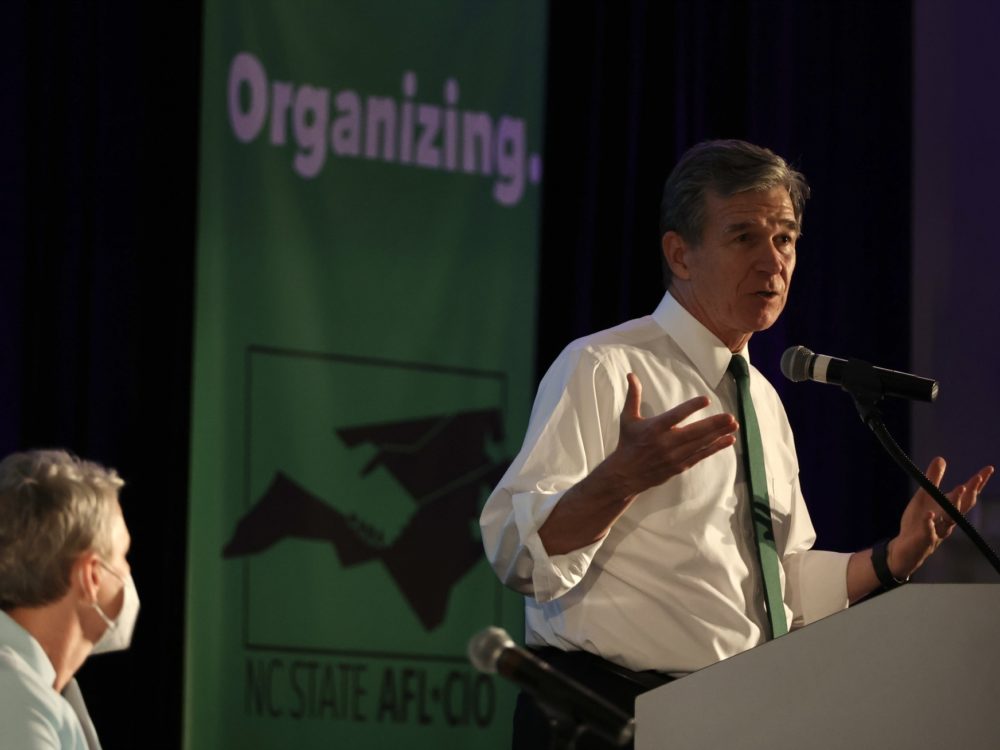Unions and their Democrat supporters have eyed North Carolina’s strong economy and manufacturing industry for years, but lately the heat has been turning up amid COVID business lockdowns, labor shortages, and a looming 2022 election.
North Carolina is a Right to Work state, meaning there is a law on the books that bans employers from making union membership a requirement to get or keep a job. That did not stop Vice President Kamala Harris in her visit to Durham last month, as she called for more unionization in North Carolina.
During her visit to Durham Technical Community College, Harris was joined by Gov. Roy Cooper and U.S. Labor Secretary Marty Walsh.
“To continue our recovery, we must then create more good-paying jobs, good union jobs. In big cities and small towns across our country, union workers are building the future,” Harris said in her Durham speech.
She spent the day touring programs and meeting students who are learning a trade, ready to enter the state’s workforce.
North Carolina’s Right to Work law prevents a “closed shop” or a company requiring workers to be union members. While workers can join labor organizations, they don’t have to, and their wages cannot be garnished for dues.
The law was passed in 1947, and in recent years efforts to enshrine the right in the state constitution have been somewhat frustrated. Supporters of a constitutional amendment say that the Right to Work protection law could be overturned by a pro-union General Assembly sometime in the future, but a constitutional amendment would protect workers’ right to work. Today 27 states have Right to Work laws, with nine states putting it in their Constitution.
“States with right-to-work laws enjoy lower unemployment rates, higher job growth, and higher wage and income growth compared with forced union states,” wrote Vincent Vernuccio in a new report from the John Locke Foundation, parent organization of Carolina Journal. “Right-to-work laws are decidedly pro-worker.”

The call to strengthen N.C.’s Right to Work status with an amendment is getting louder, as the state’s flourishing economy draws more attention from labor unions. The North Carolina AFL-CIO union held its annual convention in Wilmington in October and had Cooper, a Democrat, as a keynote speaker, plus current U.S. Senate candidate Cheri Beasley, a Democrat, and Sen. Jeff Jackson, a candidate for Congress.
The union’s annual report touts growing movement in North Carolina, although nationally union membership is shrinking to historic lows. Union membership was at its highest in the 1940s and 1950s but has been steadily declining ever since. Today, around 6% of workers are members of a private-sector union. North Carolina has the second-lowest union membership in the nation at 2.6% of workers; only South Carolina has a lower percentage of union workers. The state’s teacher union, the NCAE, has suffered dramatic losses of members and revenue as well in recent years, now having fewer than 20% of N.C. teachers as members.
The N.C. AFL-CIO is helping build new unionization in places like Charlotte Starbucks shops and the Charlotte Observer.
“We are excited to grow and strengthen the labor movement here,” N.C. AFL-CIO president MaryBe McMillian wrote in the report. “During the past year in North Carolina, nurses at Mission Health in Asheville won their first union contract, drivers at US Foods and researchers at the Center for Responsible Lending won union organizing campaigns, and more unions affiliated with our state federation and Central Labor Councils.”
A Right to Work constitutional amendment was filed in 2021 by Sen. Carl Ford, R-Rowan, and Sen. Jim Burgin, R-Harnett. It remains in the N.C. Senate Rules Committee.